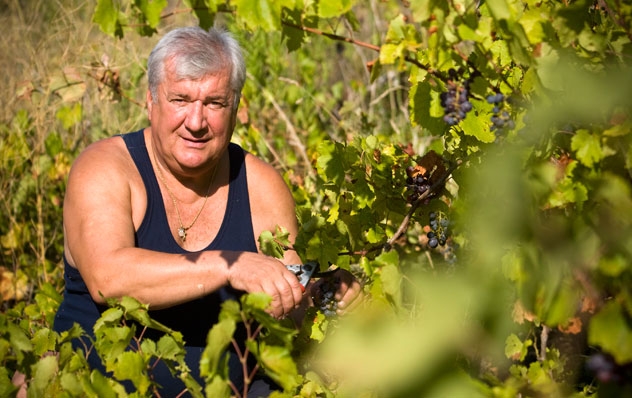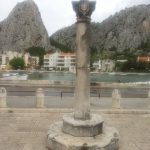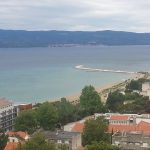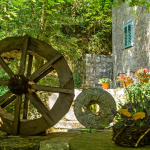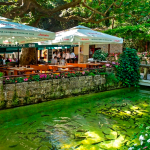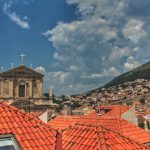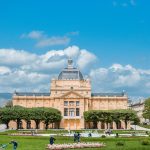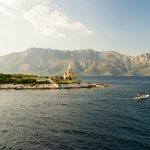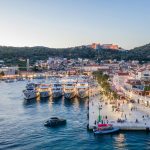Nikša Mimica or “Mimica winemaker,” as he likes to introduce himself, did not name his winery the “Home of a happy man” without a reason. The story begins, he claims, when he was a student and overheard in the narrow streets of Omiš the conversation of Academician Cvito Fisković with a group of students, explaining them the history of the sign “GRATIAS AGO TIBI DNE QUIA FUI IN HOC MONDO” (I thank You, Lord, for being in this world) above the entrance to the “Home of a happy man” of Ivan Primojević, lawyer and ambassador of the Omiš commune in Venice, said to be one of the best examples of classical Dalmatian architecture from Venetian times.
“I vowed then that I would, if I had the chance, make use of that unusually lovely, dear and symbolic sign and name something of my own the same. Naturally with the founding of a winery, especially with my conviction that wine production is my calling in making people happier, this promise had to surface. Some like to joke, so they paraphrase this Latin sign in a way that I am thanking the Lord they are drinking my wine! In any case, I see the wine business as great respect for human labour, the art of creation, art of living, so the name “Home of a happy man” is simply – ideal.”
Was Ivan Primojević truly so happy that he had his sentiment chiselled to the forefront of his home, will never be ascertained with certainty. But, Nikša Mimica already loudly proclaims that the name of his winery reflects in reality his happiness and pleasure. For which there are numerous indicators. Above all, he is happy that as the only current Mimica, he managed to preserve the wine growing and winemaking tradition of the family name known for generations by wine. He is also happy this tradition will be carried on by his daughter Petra, who completed the study of agronomics, and son Marko, in his first year of winemaking studies in Poreč. He is also happy about the recent planting of seven new varieties in his vineyards, among them, as a rarity and probably the only in Dalmatia, vines of Cibib and Omiš Vugava. He is happy, he adds, as after a long search he found on Hvar several vines of the true Omiš Rose and, he is convinced, he will no longer name his best known wine, a coupage of Plavac, Mićuša and Okatac, the Omiš Rose, to honour the variety believed to be completely gone.
“The Omiš Rose as a name noted my desire to preserve the Muscat Rose from this area at least on paper, so we don’t forget where the variety came from. The commercial name of my wine has nothing to do with the variety. However, it did pay off to persevere, it seems, and it is very possible that Omiš Rose will resurrect in the Omiš area and we won’t talk about it only in quotations of Antoni Fortis or Marmont. Several years ago in Vrboska on Hvar we discovered the existence of the Omiš Rose. We sent clones to an institute in Germany, still waiting on the DNA of the variety. This means the Omiš Rose was not lost as a variety but only as a name. There is the saying – when a name is lost, the person is lost! Well, we are on the way to revitalise the Omiš Rose in its homeland,” said Nikša Mimica.
He is also happy that, with seven vines of old Tribidrag from the north side of Omiš Dinara mountain, proven with DNA analysis to be the ancient Tribidrag, he fulfilled his father’s desire not to give up on the grapes spoken so highly of a long time ago by Mihovil Pavlinović, leader of the Croatian revival in Dalmatia.
“In history this is probably the highest valorisation of the variety, when someone tells you a variety is worth half of the largest city in the world at the time! When I cleared the old vineyard on the north side of Omiš Dinara in Svinišće, I went there with late Zlatan Plenković and Ivica Kovačević to see what could be planted there. Ivica told me to plant Plavac Mali, to which I answered: “Screw Plavac Mali which cannot see the sea!” I remember Plenković laughed so hard at these words admitting that he never heard anything more true about Plavac Mali. In the end, as countless times before, I listened to the advice of my late father, and decided to plant Pribidrag. Now comes the question why I call it Pribidrag, not Tribidrag, so I shall answer. This was the name of the variety in this area throughout history. On the other hand, Tribidrag was a name used on islands, while in Podašpilje and Omiš it was always – Pribidrag. Two names for the same thing, for the same variety. Vineyards in Dalmatia have always been cultivated with several varieties, so Pribidrag disappeared from vineyards due to its early ripening. It was ready up to 20 days ahead of others, especially Plavac Mali, so the birds would eat it, or bees. Then that vineyard had to be selectively harvested, to make wine or Prošek,” described Nikša Mimica.
How valued Pribidrag was, “and also desired by women,” explained Nikša, is sufficiently told by numerous memories of producing Prošek from the variety, “given to girls, or daughters, before they went dancing, to blush a little and be more relaxed when a man approaches them.”
When Nikša speaks of his happiness in the “Home of a happy man,” he always points out that a man who deals with wine has to be fulfilled to the maximum.
“This creation of love and desire for perfection does not leave much room to do anything else. To me, wine is also a medium for socializing, a lifestyle, way of expression, communication with the world, the link connecting me to people and enriching me with new experiences. Wine makes me, simply, happy!”
Nikša likes to say he was introduced to the barrel before the crib.
“My grandfather Niko, a peculiar persona and well-known in the area, had the greatest wish for his first grandchild to be male. When my mother brought me home from the maternity ward and they parked outside our home, he took me in his arms down into the cellar where he prepared some Prošek and a rooster feather on a shallow plate. Then he smeared me with the Prošek, made a cross on my head and practically christened me for the first time. Only afterwards did they take me to my room and my crib!”
Nikša explains that his family is documented to be in winemaking since 1714. Winemaking was the basic domestic chore in every Mimica home, “until children began to go to school and tourism started.”
“Today only my family of all Mimica descendants is in winemaking! Everything else is gone and even I started late. You know how things were after World War II, everyone went to towns. Without me, I’m not sure if there are more than 1.000 vines in Mimice and Pisko! Be it as it may, in the end I restored tradition, children will continue my work, my Mimica branch stays in winemaking!”
Until the war times, Nikša’s family lived off grapes and wine, sour cherries, salt and even some land for wheat, had their own mills, oilery, winery…
“As my father was the oldest son of my grandfather, he prepared his first vineyard, after World War II, on milk. There was no wine, milk was the only refreshment, there were sheep, cows, everything else, but not wine. Then he planted vineyards on the south and north side of Omiš Dinara, so in Yugoslavia we had a constant production of half a wagon of wine mostly for our needs, father sold only a small amount. Just enough to feed and school me and my brothers.”
Nikša’s wine story probably wouldn’t have survived had his father not worked stubbornly in the vineyard until he was 88. And insisted Nikša drive him to the vineyard each time.
“I was his oldest son. And then my father, who never drove a car, and needed it to go to the vineyard, decided to buy a car when I was 17. So I was forced to learn to drive, and for a while drove without a license! It was a Fiat 600, Italian made with a Tara radio. There weren’t many cars in Omiš at the time, and I was certainly the youngest driver. While I drove my father I had a student, peasant, winemaker and wine grower life… In the morning I would drive him to the vineyard and he would say: Are you heartless to leave your father to work alone? Then I would sometimes skip lectures and stay to work with him. My father was my main mentor, everything I learned in the vineyard and of wine was from him. He lived until he was 88 and the last ten years of his life, while we were together, he left everything up to me and I did almost everything the way he did. The way it was done 60 years ago and how my father did it.”
Ten years ago Nikša decided to plant for himself, as he likes to say, a hobby vineyard. There were 780 vines, half white, half red. Then he still knew nothing of Pribidrag or Omiš Rose, but quickly connected emotionally to the vines he worked on for decades, in other locations with his father.
“After the planting, when my wife and I came up there with my son, little Marko was eight then, I would take him by the hand and check if the vines began to grow. On one I saw a bud growing and starting to open up. Instinctively I kneeled, kissed the vine and let a tear of joy. Then my Marko went home all sad. My wife asked him: Marko, what is wrong? And he said: Mom, dad was crying! The wife had to explain for a long time what tears of joy are. When we went there again, I called Marko to join me to see what is going on with the vines, but he wouldn’t come. He told his mother he did not wish to see me crying again!”
Nikša is happy his children, besides wine, developed a love for music and a cappella singing. Although he never fulfilled his youthful dream to form an a cappella choir with friends and perform at the famed Omiš Festival of Dalmatian Klapas, he proudly says his daughter completed piano studies, while his son plays the trumpet and sings in the Puntara and Omiš Octet choirs.
“I played some trumpet in Omiš in the konobas and streets… There is the song, My Konoba, about what the konoba means to us Dalmatians. It’s not a cellar or storeroom, konoba is an institution, cultural, philosophical, business and all sorts, so I spent much time in my konoba with my dear friends, drinking wine and never getting drunk. And then came the moment my father’s vineyards came to their end. Then I planted my hobby vineyard, which in turn lit a fuse in me and brought about a commercialisation of my wine story. And this makes me incredibly happy!”
For the original and more from Vinske Priče blog on wine, click here.

